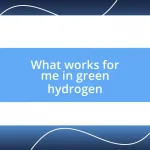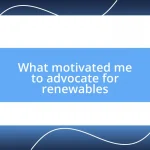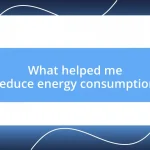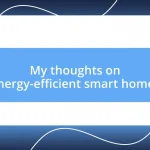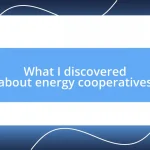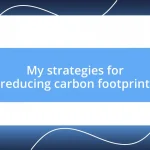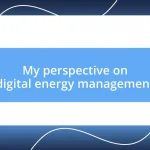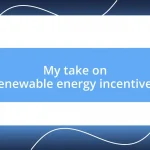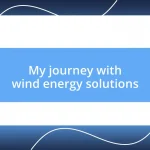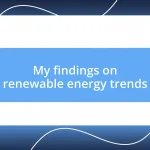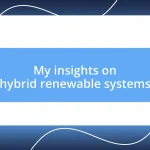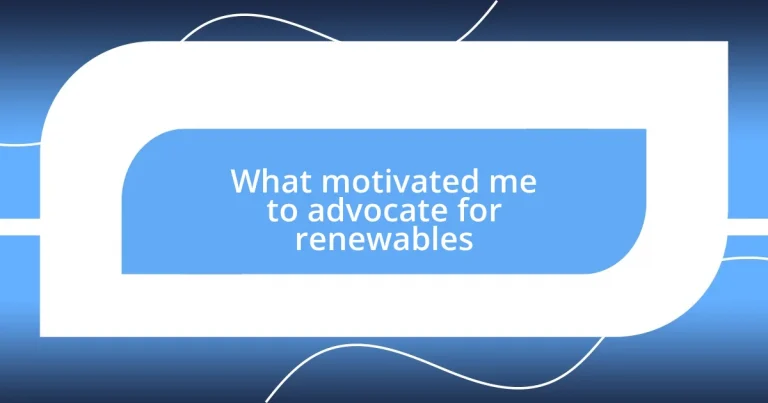Key takeaways:
- The author’s awakening to the need for renewable energy was triggered by witnessing environmental degradation during a camping trip and attending a community meeting on renewable energy.
- Personal experiences, such as installing solar panels and volunteering at a renewable energy fair, solidified the author’s commitment to sustainable living and community advocacy.
- The article emphasizes the urgent need to address climate change and the collective power of individuals to drive the transition to renewable energy for a healthier future.
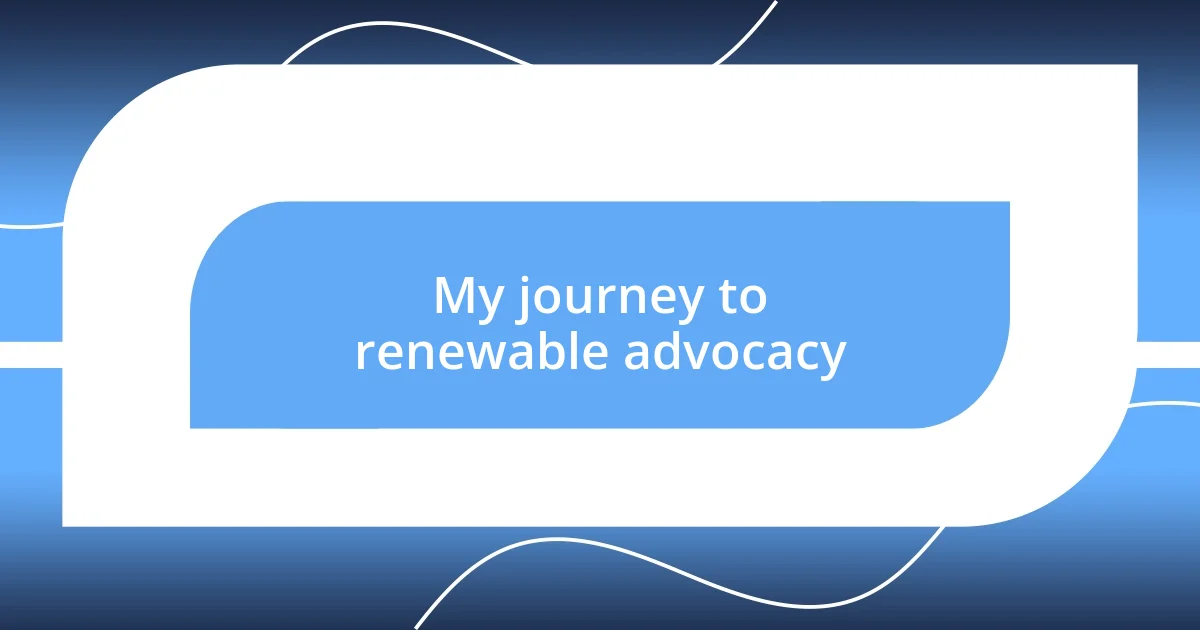
My journey to renewable advocacy
It all started during a summer camping trip when I saw the stark contrast between nature’s beauty and the pollution from nearby cities. Watching the sunset over the mountains, I felt a sense of responsibility wash over me. Could I really sit back while the environment suffered?
A turning point came when I attended a local community meeting about renewable energy. Listening to passionate advocates share their experiences stirred something within me. Their stories made me realize that change begins with individual voices—what if my voice could make a difference too?
I vividly recall the first time I installed solar panels on my home. The excitement of taking that step toward sustainability ignited a fire in me. Each ray of sunlight felt like a statement of my commitment to renewable energy. It made me ponder, if I could inspire just one person to consider the shift, wouldn’t that be worth all the effort?
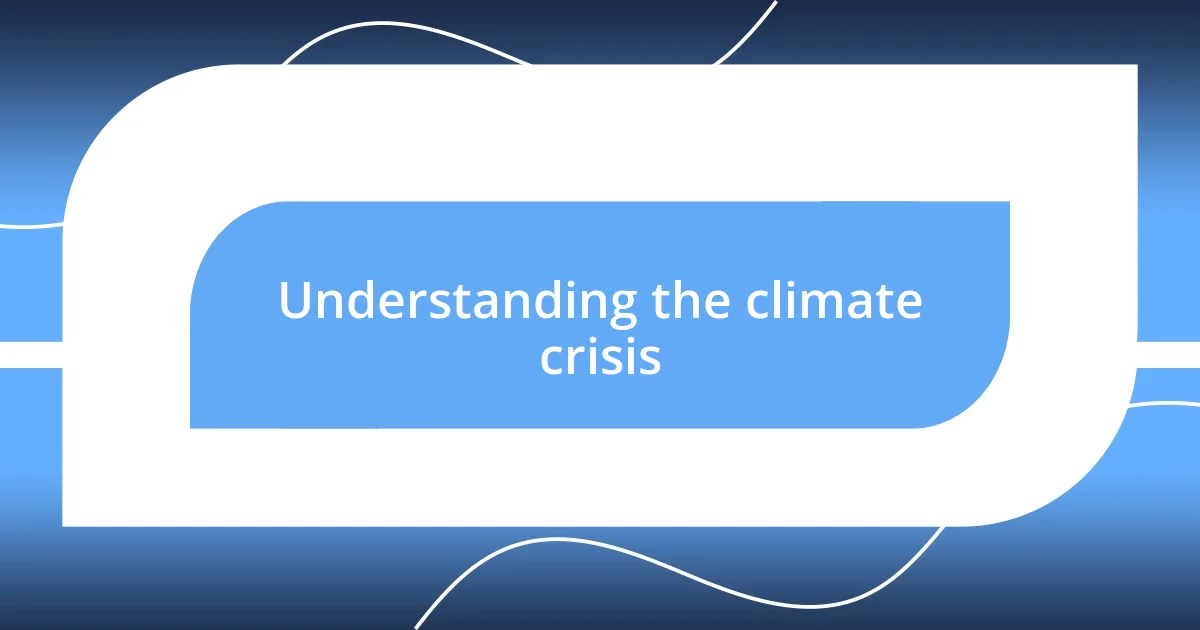
Understanding the climate crisis
Understanding the climate crisis isn’t just about statistics; it’s about the visceral, everyday experiences we live through. I recall standing on the beach, where once I’d built sandcastles as a child, only to find erosion taking its toll. The ocean felt more unpredictable then—waves crashing harder and further ashore, a stark reminder of increasingly volatile weather patterns.
Just as disconcerting are the wildfires that have become almost a regular summer threat. As I stood outside, smelling the acrid smoke in the air, I couldn’t help but think of the ecosystems disappearing in those flames. Each time I hear about a new record temperature or a natural disaster, I feel a pang of urgency. It’s a lived contrast—once thriving nature, now struggling under human influence.
Comparing the current state of our planet to what it should be feels imperative. I think about the delicate balance we all depend on, and how easy it is to overlook each small loss until they add up to a crisis. One question lingers in my mind: How long can we ignore the clear signs of a warming planet? For me, the answer is simple; not any longer, not if we want future generations to breathe clean air and enjoy vibrant ecosystems.
| Current Climate Indicators | Desired Climate Status |
|---|---|
| Increased Global Temperatures | Stable and Manageable Temperatures |
| Extreme Weather Events | Reduced Frequency of Natural Disasters |
| Melting Ice Caps | Preserved Polar Ecosystems |
| Loss of Biodiversity | Thriving and Diverse Natural Environments |
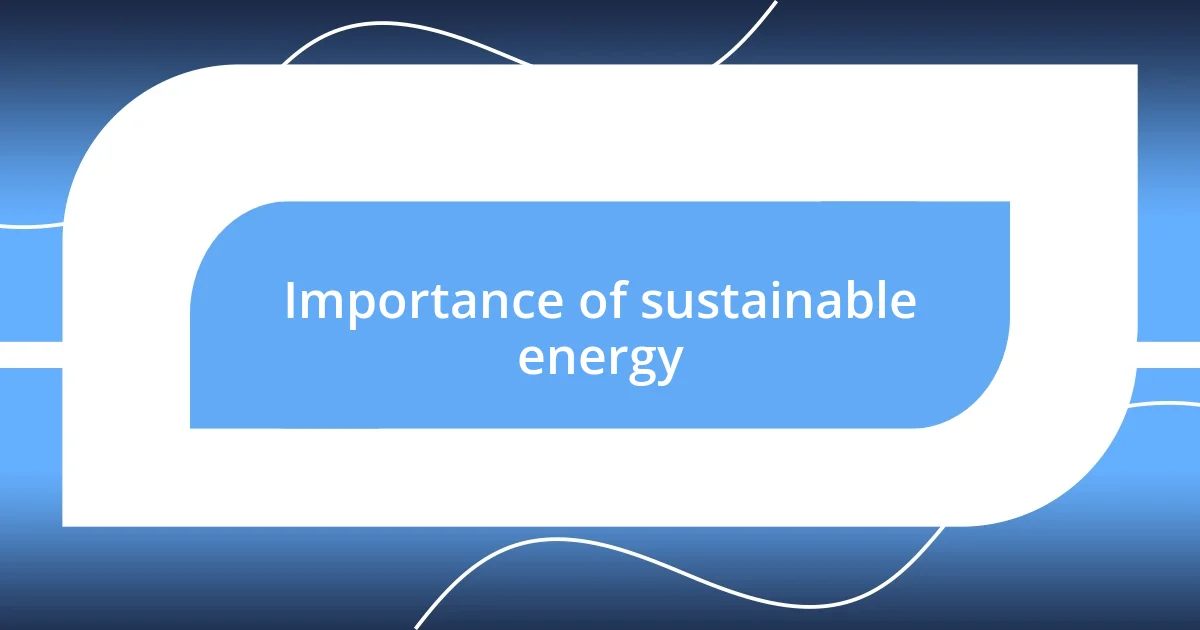
Importance of sustainable energy
Sustainable energy is crucial not only for preserving our planet but also for ensuring a better quality of life for future generations. I remember when I first witnessed the energy transition in my community; rooftops adorned with solar panels symbolized hope and collaboration. There’s something incredibly uplifting about seeing neighbors come together for a common goal—to reduce reliance on fossil fuels and protect our environment.
- Reduces greenhouse gas emissions, combating climate change.
- Enhances energy security by harnessing local resources.
- Creates job opportunities in emerging green technologies.
- Promotes healthier air quality, reducing health issues related to pollution.
- Fosters energy independence and resilience against global market fluctuations.
Every time I see a wind turbine turning gracefully in the distance, I feel a sense of pride. It’s a testament to human innovation and determination. Each step toward renewable energy feels like an act of defiance against the environmental crises we face, and it reminds me of our collective power to choose a sustainable future. Embracing renewable sources helps to create a legacy that honors our responsibility to the planet.
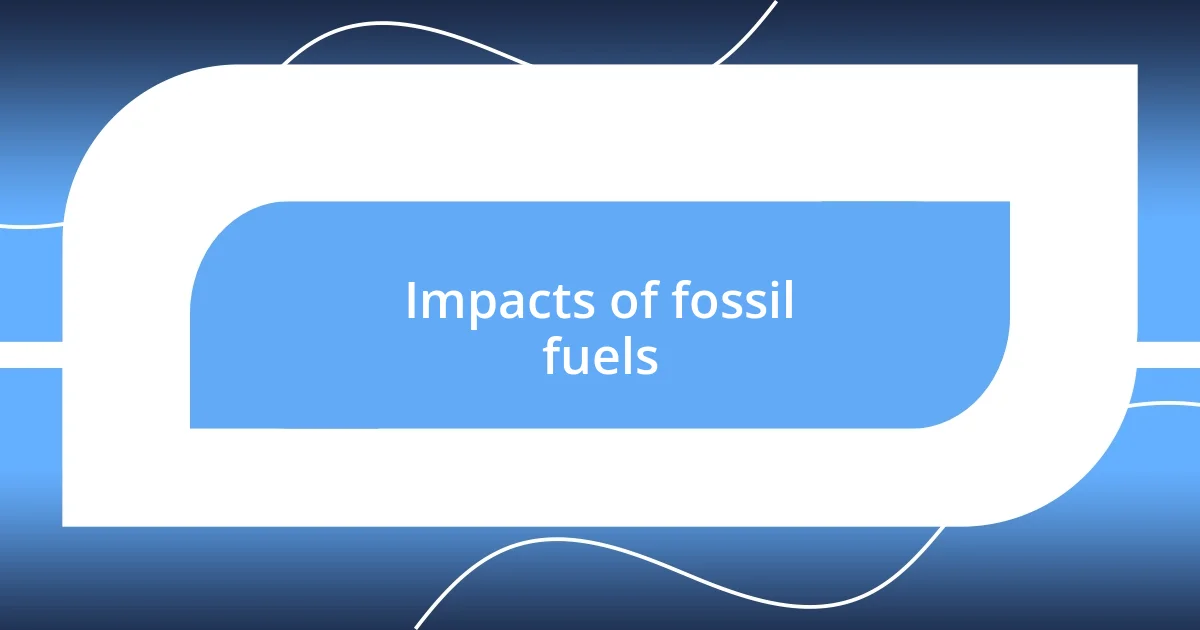
Impacts of fossil fuels
The impact of fossil fuels stretches far beyond just environmental degradation; it seeps into our daily lives and health. I remember the mornings I’d wake up to a hazy sky, knowing it was linked to emissions from nearby power plants. It made me wonder: how many more days would I and my loved ones have to endure this air quality? The thought of pollutants infiltrating our homes and bodies is unsettling, to say the least.
In my experience, witnessing the devastation caused by oil spills was profoundly disheartening. I once took a trip to a coastal area where a spill had wreaked havoc on marine life. Standing amidst the cleanup, I felt the weight of loss—not just for the wildlife, but for the community reliant on those waters. This experience left me questioning how many ecosystems and lives are sacrificed at the altar of fossil fuel dependency.
It’s hard to ignore how fossil fuel extraction impacts local communities. Friends who worked in mining often shared stories of health complications and unsafe conditions. One talked about the struggle to balance financial stability with personal well-being. Each time I heard about these issues, I was reminded that the cost of fossil fuels extends well beyond what we pay at the pump; it’s a heavy burden shouldered by many, and it drove me to seek sustainable alternatives even more passionately.
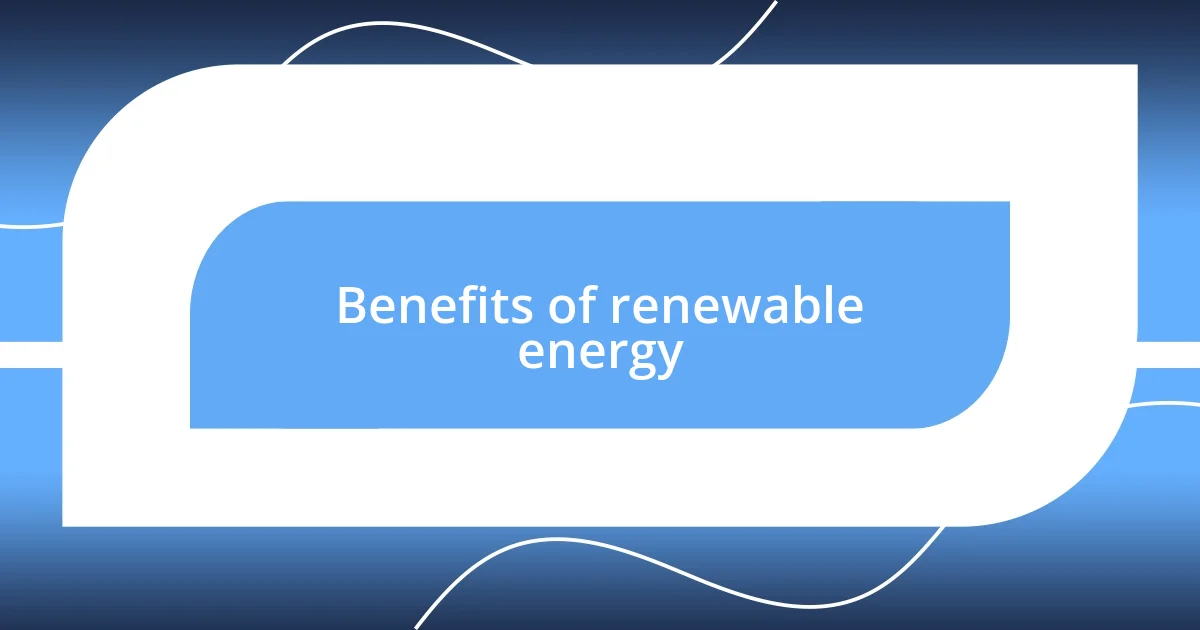
Benefits of renewable energy
The transition to renewable energy offers profound benefits that I’ve come to appreciate deeply. One of the most compelling advantages is its ability to significantly reduce greenhouse gas emissions, which play a pivotal role in climate change. I often reflect on how my morning runs used to be marred by smog, and now I can breathe deeply, knowing that cleaner energy sources like wind and solar are contributing to clearer skies.
Additionally, embracing renewables enhances energy security. By utilizing local resources, communities can decrease their reliance on imported fossil fuels. For instance, when our town invested in community solar projects, it fostered a sense of pride and unity. I remember attending a local meeting where residents shared their excitement and ideas about becoming more self-sufficient—something that was both empowering and necessary for our future.
On a personal level, it’s inspiring to see that the renewable sector is a hotbed for job creation. I recall a workshop I attended on green technologies, where I met individuals transitioning from traditional industries to renewables. Their stories were filled with hope and determination, highlighting a vital shift towards a greener economy. It made me realize that not only are we protecting the planet, but we are also investing in new opportunities for ourselves and our neighbors. How exciting is it to think that the choices we make today could lead to thriving communities tomorrow?
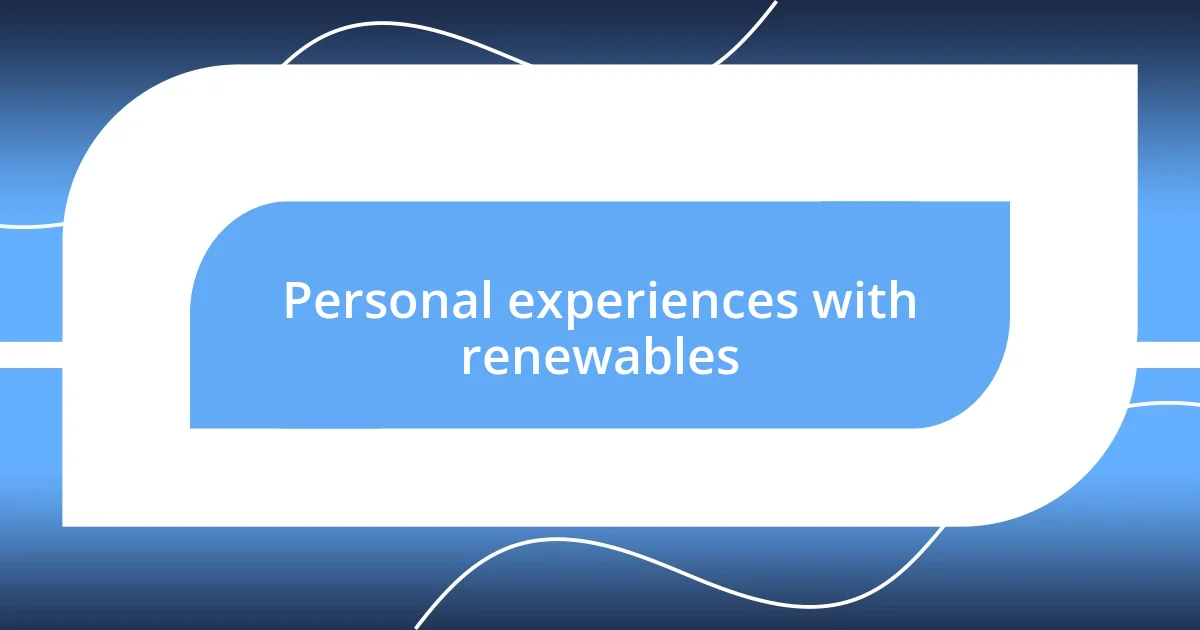
Personal experiences with renewables
I remember the first time I installed solar panels on my roof. The excitement was palpable as the technicians arrived early on a Saturday morning. Not only did I want to reduce my energy bills, but I also wanted to contribute to a shift toward sustainable living. Each time I saw the sunlight hitting those panels, it felt like a personal victory against the reliance on fossil fuels. Can you imagine that sense of empowerment, knowing you’re doing something tangible for the planet?
Then there’s the time I joined a local community garden. It was more than just growing vegetables; it was a hub for discussions about sustainable practices. I vividly recall one gathering where a friend shared his journey of transitioning from traditional energy sources to wind power for his home. His passion was infectious, and it sparked a realization in me about how interconnected our choices are. I found myself thinking—how can we take ownership of our energy consumption? This realization fueled my advocacy for renewables even further.
I also volunteered at a renewable energy fair, where I spoke to families eager to learn about their options. One father approached me, worried about his children’s future and the world they would inherit. His sincerity struck a chord in me, reminding me of my own anxieties about climate change. Listening to him, I felt a renewed sense of purpose, as if our conversations were not just sharing facts but building a community of advocates. Isn’t it amazing how our personal journeys can unite us in this cause?

